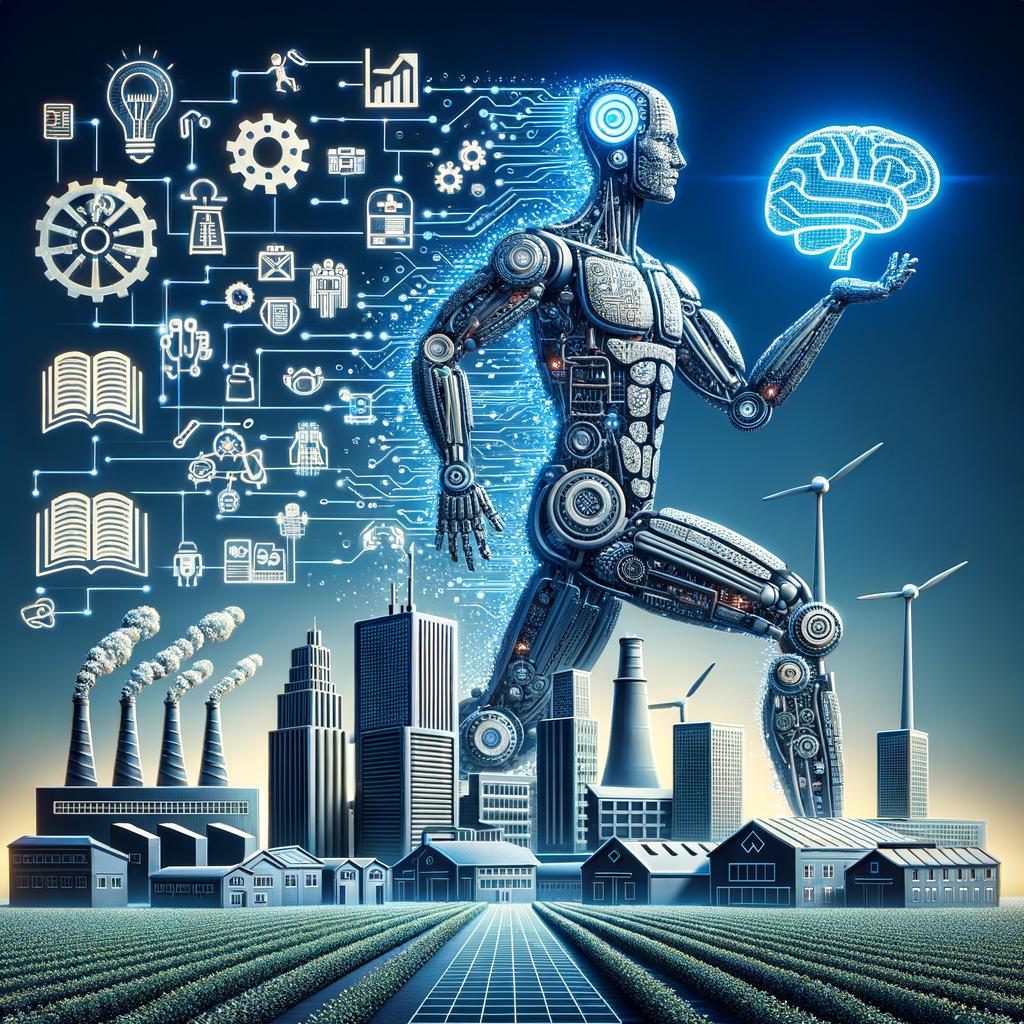The Future of Blogging Lies in AI: Here’s Why

As we embark on this exploration of the future of blogging, it is impossible to ignore the rising influence of Artificial Intelligence (AI) in various sectors, and more so in this industry. While traditional blogging has long played a substantive role in content creation and communication, we're now witnessing the advent of AI’s transformative power in this space. Known as AI blogging, this technological marvel dramatically shifts the landscape, introducing a new layer of efficiency and productivity to content creation. This enormous leap in technology may feel surprising or even overwhelming, but it signals that the world of blogging as we know it is rapidly evolving, underpinned by this AI revolution. In the subsequent sections, we will dive deeper into the intricacies of AI blogging, its impact on businesses and SEO practices, along with its benefits and challenges. So prepare to embrace and navigate this exciting new world empowered by AI, as it shapes the future landscape of blogging.
The Current State of Blogging
Blogging has solidified its position as a definitive mode of communication and avenue for content creation in our contemporary society. Renowned to be the cornerstone of the digital world, the blogging sphere has evolved radically with the passage of time, continually adapting to match the pace of technological innovation. Today, the spectrum of blogging encompasses everything from personal diaries to professional news outlets, from hobby-related sites to business websites. Blogs serve as a platform for individuals and companies alike to voice opinions, share knowledge, showcase expertise, and engage with diverse global audiences.
However, the modern blogging landscape is not free from challenges. Bloggers must grapple with the increasing competition in the digital arena as they encounter the pressure to churn out consistent, impressive content to captivate their audiences. The dynamics of Search Engine Optimization (SEO) are continually changing, challenging bloggers to stay updated to ensure their posts gain visibility. The demand for personalized content also poses its fair share of difficulties as bloggers seek to create captivating narratives that appeal to a wide range of readers. Yet, as we progress, the sihoulette of the blogging realm is undergoing a metamorphosis and the reason lies in the emerging artificial intelligence technology. Little do many realize that the future of this domain is increasingly leaning towards AI. How and why is something we will delve deeper into, as we analyze the state of blogging and its impending AI revolution.
The Emergence of AI in Content Creation
The ascent of Artificial Intelligence in the content creation world is no longer a matter of speculation, but a reality that is revolutionizing the industry. AI has begun to infiltrate blog and content creation, playing a transformative role in shaping the way information is created and disseminated. The impact of AI in this context is multifaceted. This disruption is powered by sophisticated AI algorithms and Machine learning models that not only mimic but can also generate intelligent human-like text.
AI demonstrates its competency in content creation by being capable of writing tangible articles and blog posts. Equipped with the ability to process massive amounts of data in split-seconds, AI can analyze trending topics, keywords, and searches to gather relevant information. A typical scenario would be AI software using semantics and context analysis to compile an article or blog post on a trending topic. For instance, the Washington Post’s in-house AI, Heliograf, generates insightful and well-researched short reports, showcasing the power and potential of AI in content generation.
The rampant evolution and application of AI in content creation have been observed in more than just generic blog post writings. AI technologies like OpenAI's GPT-3 are competent enough to write poetry, complete with rhyme and rhythm, thus emphasizing AI's adaptability and creative potential. This does not suggest that AI will replace poets or content creators but indicates the supplemental role AI can play in enhancing creativity and productivity.
The introduction of AI into content creation isn't merely a technological advancement but rather a revolutionary change in the landscape of blog post creation. AI’s ability to learn and analyze patterns enables it to predict and adapt to changing trends faster than human content creators. With the rapid progression in AI capabilities in blog and content creations, this advancement presages an exciting future in content creation and blogging.
Understanding AI Blogging: Basics
Firstly, AI blogging is a novel concept that involves the utilization of artificial intelligence to write and structure blog content. This means that instead of a human typing up every article, AI software generates the content based on the parameters and guidelines provided by the owner of the blog. Essentially, this technology employs algorithms that can write entire blog posts, imbuing them with relevant keywords and phrases to optimize the content for SEO.
The primary mechanisms that power AI blogging encompass natural language processing and machine learning. Natural language processing, or NLP, enables the AI to understand and interpret human language, making it possible for it to write in a way that reads naturally to the human eye. Meanwhile, machine learning gives the software the ability to improve over time; learning from its past mistakes and successes to create increasingly refined and high-quality content.
One salient point to understand about AI blogging is how it works. This process starts with the AI analyzing vast amounts of data related to the chosen topic. It then gathers and structures this information into a readable format that maintains coherency, relevance, and accuracy. The AI uses its training to avoid grammatical errors and to ensure that the article reads smoothly from one sentence to the next.
Furthermore, AI blogging doesn't just write content; it's also designed to structure it intelligently. AI tools ensure that not only is the content readable, but that it is also presented logically to enhance comprehension. This is particularly useful for creating segmented content for blog posts, where each part of the post dives into different, yet related aspects of the main topic.
In conclusion, while AI blogging is relatively new, increasing numbers of bloggers are choosing its convenience and efficiency over traditional writing methods. NLP and machine learning are redefining how blog and content creation is perceived and executed in the digital age. The fact that AI tools can now write blog posts that are not only readable but engaging to the audience, it's a revolutionary step in the modern world of blogging.
Benefits of AI in Blogging

Artificial Intelligence (AI) has begun to reshape numerous industries, and blogging is no exception. One of the most significant advantages AI presents is a substantial increase in productivity and efficiency. For instance, AI-powered tools can analyze extensive amounts of data quickly and create content on varying topics in a fraction of the time it takes humans. Consequently, bloggers can churn out a higher volume of posts with less time investment, thereby boosting their operation's overall efficiency.
Furthermore, AI in blogging may provide more insightful, data-driven content. For instance, AI data mining can trawl through vast amounts of digital content, extracting meaningful insights that can inform topical, relevant blog contents. As AI evolves, it's likely to become even better at identifying complexities in data, drawing conclusions, and presenting findings in an impressive manner.
Additionally, AI holds considerable promise for increasing blog personalization. Advanced AI algorithms can analyze a reader’s browsing behavior to suggest relevant, timely blog content, enhancing user engagement. This personalization means bloggers can better target their content, providing blog pieces that are tailor-made to their audiences' preferences.
AI can also aid the proofreading process in blogging. With AI-powered tools, error detection and correction become more efficient than manual proofreading. This technology can scan text for grammatical errors, biased language, and style inconsistencies, enhancing the overall quality of the blogging output.
Moreover, apart from writing blogs, AI can also be beneficial in marketing them. AI can analyze user behavior and give insights into what type of content is gaining traction. Based on these insights, it can automatically adjust the promotion strategies ensuring maximum reach and effectiveness.
Lastly, AI could revolutionize translation in blogging, making every post multi-lingual and accessible throughout the globe. AI translation software could bridge the language gap, allowing bloggers to reach broader, diverse audiences.
In summary, AI has the potential to reshape blogging dramatically. It can streamline content creation, personalize blog suggestions, improve proofreading, transform marketing tactics, and break down language barriers. As AI continues to evolve, the role it plays in blogging will likely continue to grow.
How AI Blogging is Transforming Business
There's no denying the significant imprint that artificial intelligence (AI) in blogging is leaving on the business world. AI is not only reshaping blogging but also transforming business communication, marketing strategies, and customer engagement. Companies are leveraging AI-powered blogging to get their message across more effectively. For instance, major e-commerce platforms now use AI to generate product descriptions, creating a uniform and streamlined tone across all their products, thus enhancing brand consistency.
The practicality of using AI in blogging doesn't stop at efficiency. It reaches into the realm of data analysis and predictive trends that can greatly enhance a business' capacity to market effectively. For instance, AI can analyze a user's browsing history and suggest topics or products relevant to their interests. Companies like Amazon have leveraged this method to increase their sales. In this context, AI-driven blogging shows the potential to revolutionize predictive marketing.
The AI transformation is also favouring small businesses. It's phased out the nuisance of cost for professional copywriters. Platforms like OpenAI are democratizing the creation of high-quality content, allowing startups on a shoestring budget to compete with established firms. The affordability and accessibility of AI blogging are indeed leveling the playing field, making it easier for small businesses to gain visibility and grow.
Furthermore, AI blogging is tailoring efforts towards enhancing user experience and interaction. It has capabilities to generate personalized content, based on users' preferences, likes, and dislikes. Netflix is a great example of this application; it uses AI to offer personalized recommendations for users, thus improving user engagement and satisfaction.
Overall, AI blogging is becoming an invaluable tool in modern business. In an age where digital presence matters significantly, AI's role in shaping quality and relevant content cannot be understated. With its cheap yet effective content creation to its skill in predictive marketing and improving user interaction, AI blogging is certainly poised to be the game-changer in various business operations.
AI and SEO: A Successful Partnership

Artificial intelligence has undeniably had a significant impact on SEO practices, shaping a new, more efficient partnership between the two. AI-powered systems are known to be instrumental in deciphering complicated algorithms to optimize search engine rankings. These smart systems can interpret and predict shifting trends and SEO patterns, learning to identify search behavior and keyword relevancy. This insight allows bloggers to tailor their content, enhancing its visibility and reach.
This relationship between artificial intelligence and SEO is a major advantage for content creators. For instance, AI tools such as BrightEdge and MarketBrew offer incredibly accurate predictions about how particular changes might influence a site’s SEO performance. By utilizing machine learning capabilities, these tools make intelligent suggestions for content optimization that would hit the correct notes with your audience, thereby assisting in creating an engaging and well-ranked blog.
The influence isn't unilateral, though. While artificial intelligence aids SEO, SEO data also enriches AI. This is effectively illustrated by search engines like Google, which use SEO data to refine their AI algorithms, making search results more accurate and relevant for users. By so doing, their AI becomes increasingly adept at understanding and anticipating user needs, leading to better search results and content recommendations.
Overall, the intersect of artificial intelligence and SEO holds substantial potential for the future of blogging. This dynamic partnership capitalizes on the core strengths of AI – in-depth analysis, quick decision making, prediction abilities - to supercharge SEO practices. This symbiotic relationship only serves to boost the capabilities of both, resulting in a fulfilled reader and higher blog traffic and engagement.
Sophisticated AI Tools for Efficient Blogging
Artificial Intelligence is not a future fantasy but a present-day tool, harnessing an array of applications in various sectors, with blogging being no exception. Blogging, being a dynamic landscape, is constantly evolving, and sophisticated AI tools have started to play a pivotal role in enhancing content creation efficiency. These tools, equipped with cutting-edge AI technology, can generate content, suggest topics, perform SEO optimization, and more, all with minimal human intervention.
Take Articoolo, for instance; a tool that uses natural language generation and processing to create readable and meaningful blog posts within minutes. Whether you need a blog post, an article review, or a report, Articoolo can generate it for you with impressive speed and accuracy. Similarly, INK, an AI-powered writing tool, optimizes your content for SEO while suggesting improvements in real time. It takes care of everything from analyzing keywords, optimizing metadata, and predicting content performance, thus saving bloggers considerable time and effort. Jarvis is another incredible example of an AI tool. It generates engaging, high-quality content that reads as if written by a human. It can predict what you want to write next, and can flawlessly work on different content types, like blog posts, social media content, and email newsletters.
So don’t wonder; equipped with these sophisticated AI tools, the future of efficient blogging lies within reach. Harness the power of AI, and let it transform your blogging experience immensely. Their precision, efficiency, and time-saving attributes are certain to revolutionize the blogging landscape.
AI Blogging vs. Human Writing: A Comparison
Exploring the juxtaposition of artificial intelligence (AI) generated content and traditional human-written blogging brings into focus a unique clash of creativity and technology. AI's strengths such as efficiency, consistency and data analysis offer a palpable contrast against the creative fluidity, emotional nuance, and subjective perspectives that human writers are known for. Take for instance the AI tools like Wordsmith, Articoolo, and Quill, popular for their prowess in analyzing data, spitting out factual, error-free reports and articles at near-lightning speeds. They excel in covering news events, weather reports, sports scores–topics depending heavily on data. However, when it comes to nuanced intricacies of thought pieces, personal experiences or engaging narratives, humans still hold their own. The practical unpredictability, emotion and years of life experience that pours into a human-authored post offers a richness that AI, for now, struggles to emulate fully. Ultimately, an AI's capacity to write depends on its programming - as creative as this coding may be, it is anchored firmly in its utilitarian principle of efficiency and consistency. On the other hand, human writing is as varied as the thoughts, emotions, and experiences that inspire it. While AI has the potential to reinvent the process of content creation, its capacity to replace the human touch in narrating the human experience is debatable.
Case Studies: Successful AI Blogging Applications
Artificial intelligence has left a mark in the realm of content creation, particularly in blogging. In fact, several success stories echo this reality. First off, a reputed digital marketing company adopted an AI blogging tool, the consequence of which was nothing short of extraordinary. The tool streamlined their content generation process, enabling the team to create a massive amount of high-quality blogs within a short span, thus increasing their overall productivity.
The influence of AI isn't solitary to content generation. A noteworthy example surfaced when a leading online newspaper attempted utilizing AI in a pilot project. They integrated AI into their editorial process to suggest innovative blog ideas based on trending topics and user preferences. This resulted in higher engagement rates and a surge in their website traffic.
AI blogging also proved beneficial in the educational realm. As an instance, an EdTech company utilized AI for their blog updates. It managed to simplify complex topics into comprehensive, reader-friendly content, proving to be a boon for their audience comprising mainly students and educators.
Commercial sectors didn't remain unaffected either. A prominent online retail brand harnessed the potential of an AI blogging tool that curated unique descriptions for their multitude of products. The tool offered valuable time economy and improved product visibility.
AI's efficiency stretches to SEO as well. A case in point would be the improvement brought to a blog through the usage of an AI blogging tool incorporating keyword suggestions, meta descriptions, and more. The alterations saw a substantial upsurge in the blog’s search engine ranking.
A corporate entity, too, observed significant results after adopting AI blogging. The tool supported them in generating daily market reports, drafting error-free and compelling content that saved hours formerly spent on the task.
The value addition provided by AI tool was witnessed in the world of event blogging as well. An event planning agency turned to AI to craft descriptive blogs about their upcoming events, resulting in a more personalized user experience and an increase in ticket sales.
Maximizing productivity, enhancing engagement, simplifying complexities, and aiding in SEO – these case studies spotlight the numerous dimensions AI affects in the blogging industry. AI's versatility and effectiveness make its future in blogging not just promising, but indeed inevitable.
The Future of AI in Blogging
Analyzing current market trends, it becomes evident that Artificial Intelligence (AI) will play an essential role in the future of blogging. Various subject matter experts are conducting detailed research and making interesting predictions about the alliance of AI and blogging. Renowned entrepreneur Kelvin Looi, for example, suggests AI will soon help bloggers create more targeted and personalized content.
Secondly, as advancements in AI occur, unique blogging tactics will emerge. Top-tier AI tools like Quill and Wordsmith already offer data-oriented blogging solutions, facilitating content production at an unprecedented scale and speed. As Stanford Professor Andrew Ng stated, "AI is the new electricity." It's predicted that soon, blogging will likewise be heavily reliant on AI technology.
Thirdly, AI will play a significant role in blog optimization. Given the detailed SEO processes required for better online visibility, AI is poised to simplify this procedure. SEO insight is valuable in the world of blogging, and with AI's help, we can predict a rise in high-quality, SEO-optimized blogs.
In a practical application, IBM's AI platform, Watson, successfully managed an autonomous blog campaign for the Art Institute of Chicago - increasing the average visit duration by 28%. As AI continues demonstrating such promising results, its place in the blogging ecosystem will strengthen.
Finally, while critics note the lack of human touch in AI-generated content, we must remember that AI tools are designed to assist, not replace. Their adoption and integration into blogging will only create a more dynamic, efficient, and advanced environment, marking an exciting future for the blogging industry.
Challenges and Limitations of AI Blogging

While the capabilities of artificial intelligence (AI) in blogging offer numerous advancements, they also come with certain challenges and limitations. First, the lack of emotional intelligence in AI is a major concern. These machines, though smart, lack human emotions and can’t express feelings or moods in their written content. They fail to understand humor, sarcasm, or subtle nuances that human creatives intuitively weave into their blogs.
AI systems also struggle with complex and abstract concepts. They may falter when generating content around themes like philosophy or ethereal art forms since they rely on data and algorithms instead of experiences and abstract thoughts. No matter how advanced, AI's ability to interpret, understand, or create abstract concepts is limited and can be seen as a significant drawback.
Moreover, AI lacks originality and creativity. Even though AI can generate blogs quickly and without fatigue, it lacks the human creativity element. AI blogs might be technically correct, precise, and thorough, but the spark of spontaneity, depth, and original thought found in human writing is missing.
Furthermore, ethical and legal concerns pose challenges to AI blogging. Copyright infringement and plagiarism are common issues since AI functions by processing vast amounts of data from the web, and sometimes this includes copying content directly. These limitations remind us that, while AI blogging has its advantages, there are still areas where human intuition, originality, and creativity remain irreplaceable.
Preparing for the AI Blogging Revolution: Tips and Tricks
As we brace for the AI-centric revolution in blogging, it's crucial to equip ourselves with apt tools and strategies. Prioritize learning about AI and its functionalities in content creation. Courses and webinars by experts offer insights into the basics of AI technology and its role in blogging. Understand its capabilities, grasping the dynamics of how it streamlines the writing process.
Next, maintain your keenness for traditional content creation methods. This is not about replacing talent with technology, it's about merging them for an optimal outcome. Knowledge of the essentials of blogging, particularly with respect to SEO practices, can enable you to guide the AI tool better.
Establish a comfortable rhythm of employing AI tools. Start small, maybe with simple articles or product descriptions, then gradually incorporate AI output in more complex blogs. This will foster a seamless transition, minimizing friction between traditional and technologically advanced methods.
But remember that while AI has its strengths, it has its limitations. Deciphering nuanced language or understanding the depth of human emotions is currently beyond its scope. Utilizing AI to its strengths while bridging gaps with your human touch can result in a potent formula for writing success.
Investing in powerful tools is also key. Use AI platforms designed for blogging, like Ai-writer or WordAI. These help in ensuring high-quality output, saving you time and enhancing your productivity.
Stay abreast of the trends in AI blogging. Keeping an eye on future landscape transformations will ensure you are not caught off-guard by rapid changes.
Lastly, embrace the shift rather than shying away from it. AI is here to stay and offers enormous potential to writers who can leverage its capabilities correctly.
Conclusion
Reflecting on the incredible advances and impacts AI has brought to the blogging industry, it is undeniable that it presents a future full of promise. AI has not only revolutionized the way content is created, with efficiency and productivity at its core, but it has also drastically transformed business communication, SEO practices, and content relevance. It marks the dawn of an era where technologically driven micromanaging tools elevate content to an unparalleled standard, creating precision-targeted communication tools with all the benefits of human intelligence and none of its flaws.
On the flip side, it's essential to acknowledge the challenges and limitations AI holds. While AI brings calculated predictability and efficiency, it currently lacks the genuine creativity and emotional intelligence that human writers bring to the table. To thrive in this AI-powered blogging world, it will require both adaptability and an open mind. Celebrating the blend of technology and human intelligence, the future of blogging will redefine how we understand and consume content.
